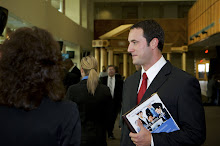90 Days: Planning a Move to Your Second Job
Special to THE WALL STREET JOURNAL
Ask most people about their first job – how they got it, how long they were there – and they can probably share a lot of details. But, ask them about their second job, and their responses will probably be a lot more elusive. For some, it will be a struggle to even remember what the job was. But that second job actually holds a lot more weight than many people realize and can often set a particular career path – and its success -- in motion. Ample thought should be given to when and where to move, say experts like Steve Piazzale, a career and life coach in Mountain View, California, who runs BayAreaCareerCoach.com.
Your First 90 Days
Take advantage. Coming off your first job, you're in a solid position. "You have experience coupled with recent education, a great combination," says Mr. Piazzale. If you've had any opportunities to work on big projects or have tangible results to show, even on a small scale, mention it. Play up these facts in your cover letter and in your interview.
Downplay the negative. If you haven't been in your first job for very long, it could raise questions about whether you're a "job hopper." You can soften the reaction by being clear about your reasons for moving, focusing on a desire for a new challenge or a readiness for increased responsibility. Or, if your first job was in a field unrelated to your training and education and you want to get back into your original field, be prepared to do a bit of work before you launch a job search. "Companies would rather hire someone with clear direction," says Mr. Piazzale. If you're contemplating a move to something different, give yourself that direction while still in your current job. Ask for more responsibility in areas that mirror what you'd like to be doing in job No. 2 to show potential employers you know what you want to do.
Update your resume and interview style. It sounds like a given, but a first-timer's resume is likely to list internships and college leadership roles. Now you've got experience and you'll need to make sure it shows. "The resume definitely needs to change to emphasize your accomplishments," says Mr. Piazzale. "It's important to keep in mind that the best kind of resumes communicate what you can do for a potential employer." And that requires a style update, too.
Your resume bullet points should demonstrate how you used your skills to solve problems and produce value at that first job. "With a first job under your belt, you can also use them as stories of value during interviews," offers Mr. Piazzale.
Now that you've had bottom-line responsibility, you've also got more to talk about in an interview. Bringing up the time you helped your fraternity raise $10,000 for charity isn't as valuable an example for job No. 2 as a story about the time you saved the company $100,000 when an idea you had was implemented. Play up the on-the-job experience and leave your university days as an afterthought. Practice mock interviews with a friend, if possible.
Don't burn bridges. When it comes to the second job, college or summer job references alone won't do, either. It's important to have at least one reference from your first job, so try your best to leave on good terms. "Give them plenty of notice, provide an orderly transition," says Mr. Piazzale. "When the potential employer calls your old employer and asks (if you are) re-hirable, the answer will be yes." A peer reference is better than no reference, so, if you have to hide your job search from your manager, find a coworker who can speak to your skills.
Slow down. If you're at your first job and simply pondering a move, give it a little time. "Try to stay in your first job – assuming it's related to your degree – for at least a few years before making the job change," recommends Mr. Piazzale. And, if you need more specific experience to get the job you want, it might pay to stay at your first job for another few months. The more experience you gain, the better off you'll be when it comes time to jockey for your next position.
Reach out. Once you've updated your resume and determined your expectations, it's probably worth your time to reach out to recruiters who specialize in your field to test the waters. A good recruiter will honestly assess your experience level and your chances of landing the second job you're looking for.




No comments:
Post a Comment